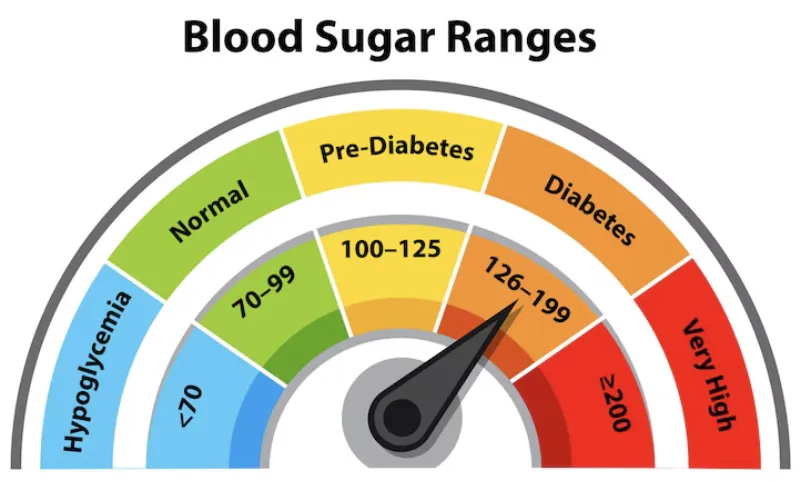Understanding Sugar Levels and Their Impact on Health

Maintaining balanced blood sugar levels is crucial for overall health. Blood sugar, also known as glucose, is the primary source of energy for the body's cells. However, when the body's ability to regulate blood sugar becomes impaired, it can lead to various health conditions, particularly diabetes. This article explores the relationship between sugar levels and diseases, highlighting the importance of maintaining healthy blood sugar levels to prevent serious health complications.
What Are Sugar Levels?
Blood sugar levels refer to the amount of glucose present in the bloodstream at any given time. The body regulates these levels through the actions of insulin, a hormone produced by the pancreas. Insulin helps cells absorb glucose from the blood for energy or storage. Under normal circumstances, blood sugar levels rise after eating and return to normal as insulin facilitates glucose uptake into cells.
Normal Blood Sugar Levels
The American Diabetes Association (ADA) defines normal blood sugar levels as follows:
- Fasting (before meals): 70–99 mg/dL (milligrams per deciliter)
- Two hours after eating: Less than 140 mg/dL
- Random (anytime during the day): Less than 140 mg/dL
Maintaining blood sugar within these ranges ensures that the body has adequate energy without the risk of harmful fluctuations that could lead to health complications.
High Blood Sugar (Hyperglycemia)
When blood sugar levels are consistently high, a condition known as hyperglycemia occurs. This can happen when the body does not produce enough insulin or when cells become resistant to insulin, leading to a buildup of glucose in the bloodstream. Hyperglycemia is commonly associated with diabetes, particularly Type 2 diabetes, and can result from:
- Poor diet (e.g., high intake of sugary or processed foods)
- Lack of physical activity
- Obesity
- Stress or illness
Health Risks of Hyperglycemia:
- Diabetes: Long-term high blood sugar is a hallmark of both Type 1 and Type 2 diabetes. If left untreated, it can lead to serious complications such as nerve damage, kidney disease, and cardiovascular problems.
- Heart Disease: Chronic hyperglycemia increases the risk of atherosclerosis (hardening of the arteries), leading to heart attacks and strokes.
- Vision Problems: Prolonged high blood sugar can damage the blood vessels in the eyes, leading to diabetic retinopathy, a leading cause of blindness in adults.
- Kidney Damage: Hyperglycemia can damage the kidneys' filtering system, leading to kidney disease and potentially kidney failure.
Low Blood Sugar (Hypoglycemia)
On the opposite end of the spectrum, low blood sugar, or hypoglycemia, occurs when the body’s glucose levels drop too low, usually below 70 mg/dL. This condition is less common than hyperglycemia but can be dangerous if not addressed promptly. Hypoglycemia often results from:
- Overmedication (especially in people with diabetes)
- Skipping meals or fasting
- Excessive alcohol consumption
- Intense physical activity without proper nutrition
Health Risks of Hypoglycemia:
- Fatigue and Weakness: Without enough glucose, the body and brain lack the necessary energy to function efficiently, leading to fatigue and dizziness.
- Severe Cognitive Impairment: The brain relies heavily on glucose for function. Low sugar levels can result in confusion, difficulty concentrating, and in extreme cases, loss of consciousness or seizures.
- Accidents and Injuries: Severe hypoglycemia can lead to fainting or a lack of coordination, increasing the risk of falls or accidents.
The Role of Insulin Resistance in Disease
Insulin resistance is a condition where the body’s cells become less responsive to insulin, forcing the pancreas to produce more of it to regulate blood sugar levels. Over time, this can lead to higher blood sugar levels and eventually Type 2 diabetes. Insulin resistance is often linked to:
- Obesity
- Lack of physical activity
- Unhealthy diet (especially diets high in sugar and fats)
Chronic insulin resistance increases the risk of developing a number of serious health conditions, including:
- Type 2 Diabetes
- Heart Disease
- Stroke
- Fatty liver disease
Managing Blood Sugar Levels
Proper management of blood sugar is essential for preventing or managing diseases associated with high or low sugar levels. Here are some key strategies for maintaining balanced blood sugar:
- Eat a Balanced Diet: Focus on whole grains, lean proteins, vegetables, and healthy fats while limiting processed foods and sugary snacks.
- Exercise Regularly: Physical activity helps regulate insulin sensitivity and helps the body use glucose more effectively.
- Monitor Blood Sugar: People with diabetes should regularly monitor their blood sugar levels to ensure they are within the recommended range.
- Maintain a Healthy Weight: Achieving and maintaining a healthy weight reduces the risk of insulin resistance and Type 2 diabetes.
- Limit Stress: Chronic stress can increase cortisol levels, which in turn can raise blood sugar levels.





